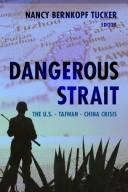| Listing 1 - 3 of 3 |
Sort by
|
Book
ISBN: 9888455656 9888208306 9789888455652 9789888208302 Year: 2019 Publisher: [Place of publication not identified] HONG KONG UNIV Press
Abstract | Keywords | Export | Availability | Bookmark
 Loading...
Loading...Choose an application
- Reference Manager
- EndNote
- RefWorks (Direct export to RefWorks)
The two Taiwan Strait crises took place during a particularly tense period of the Cold War. Although each incident was relatively brief, their consequences loom large. Based on analyses of newly available documents from Beijing, Taipei and Washington, Pang Yang Huei challenges conventional wisdom that claims Sino-US misperceptions of each other's strategic concerns were critical in the 1950s. He underscores the fact that Washington, Taipei and Beijing were actually aware of one another's strategic intentions during the crises. He also demonstrates conclusively that both 'crises' can be understood as a transformation from tacit communication to tacit accommodation. An important contribution of this study is a better understanding of the role of ritual, symbols, and gestures in international relations.
Chinese reunification question, 1949 --- -United States --- United States --- Taiwan --- China --- Taiwan Strait. --- Foreign relations --- -Chinese unification question, 1949 --- -Reunification of China question, 1949 --- -Unification of China question, 1949 --- Formosa Strait --- Tʻai-wan hai-hsia --- Taiwan haixia

ISBN: 0231135645 0231509634 0231135653 Year: 2005 Publisher: New York Columbia university press
Abstract | Keywords | Export | Availability | Bookmark
 Loading...
Loading...Choose an application
- Reference Manager
- EndNote
- RefWorks (Direct export to RefWorks)
Today the most dangerous place on earth is arguably the Taiwan Strait, where a war between the United States and China could erupt out of miscalculation, misunderstanding, or accident. How and to what degree Taiwan pursues its own national identity will have profound ramifications in its relationship with China as well as in relations between China and the United States. Events late in 2004 demonstrated the volatility of the situation, as Taiwan's legislative elections unexpectedly preserved a slim majority for supporters of closer relations with China. Beijing, nevertheless, threatened to pass an anti-secession law, apt to revitalize pro-independence forces in Taiwan-and make war more likely. Taking change as a central theme, these essays by prominent scholars and practitioners in the arena of U.S.-Taiwan-Chinese relations combine historical context with timely analysis of an accelerating crisis. The book clarifies historical developments, examines myths about past and present policies, and assesses issues facing contemporary policymakers. Moving beyond simplistic explanations that dominate discussion about the U.S.-Taiwan-China relationship, Dangerous Strait challenges common wisdom and approaches the political, economic, and strategic aspects of the cross-Strait situation anew. The result is a collection that provides fresh and much-needed insights into a complex problem and examines the ways in which catastrophe can be avoided. The essays examine a variety of issues, including the movement for independence and its place in Taiwanese domestic politics; the underlying weaknesses of democracy in Taiwan; and the significance of China and Taiwan's economic interdependence. In the security arena, contributors provide incisive critiques of Taiwan's incomplete military modernization; strains in U.S.-Taiwan relations and their differing interpretations of China's intentions; and the misguided inclination among some U.S. policymakers to abandon Washington's traditional policy of strategic ambiguity.
China --- Taiwan Strait --- Taiwan --- United States --- Foreign relations --- Strategic aspects. --- S09/0610 --- S26/0515 --- S26/0620 --- China: Foreign relations and world politics--China and USA: since 1949 --- Taiwan--China's claim to Taiwan (and vice-versa) --- Taiwan--International politics --- Formosa Strait --- Tʻai-wan hai-hsia --- Taiwan haixia --- POLITICAL SCIENCE / International Relations / General.
Book
ISBN: 1935049844 1935049445 9781935049845 9781935049449 Year: 2012 Publisher: Boulder FirstForumPress
Abstract | Keywords | Export | Availability | Bookmark
 Loading...
Loading...Choose an application
- Reference Manager
- EndNote
- RefWorks (Direct export to RefWorks)
Why did the Truman administration reject a pragmatic approach to the Taiwan Strait conflict--recognizing Beijing and severing ties with Taipei--and instead choose the path of strategic ambiguity? Dean Chen sheds light on current US policy by exploring the thoughts and deliberations of President Truman and his top advisers, among them Dean Acheson, John Foster Dulles, Livingston Merchant, and Dean Rusk. Chen also highlights the very unambiguous, and continuing, liberal aims of US Taiwan policy.
United States --- Taiwan --- China --- Taiwan Strait --- Taiwan Sheng zheng fu --- Tʻai-wan sheng cheng fu --- Taiwan xing zheng zhang guan gong shu --- Tʻai-wan hsing cheng chang kuan kung shu --- Taiwan Sheng xing zheng zhang guan gong shu --- Tʻai-wan sheng hsing cheng chang kuan kung shu --- Tʻai-wan --- Taĭvan --- Formosa --- Taiwan Sōtokufu --- Government-General of Taiwan --- Taiwan sheng --- Tʻai-wan sheng --- Taiwan Provincial Government --- Taiwan zong du fu --- Tʻai-wan tsung tu fu --- Xiaoliuqiu --- 臺灣 --- 台灣 --- Тайвань --- Tajvan --- Тайуан --- Taĭuan --- Tayiwani --- Taywan --- Taivanas --- Taiwana --- Taihuan --- Тайван --- China (Republic : 1949- ) --- Formosa Strait --- Tʻai-wan hai-hsia --- Taiwan haixia --- Foreign relations --- Strategic aspects. --- International relations. Foreign policy --- United States -- Foreign relations -- Taiwan. --- Taiwan -- Foreign relations -- United States. --- United States -- Foreign relations -- China. --- China -- Foreign relations -- United States. --- Taiwan Strait -- Strategic aspects. --- Taiwan -- Strategic aspects. --- POLITICAL SCIENCE / World / Asian. --- United States of America
| Listing 1 - 3 of 3 |
Sort by
|

 Search
Search Feedback
Feedback About UniCat
About UniCat  Help
Help News
News